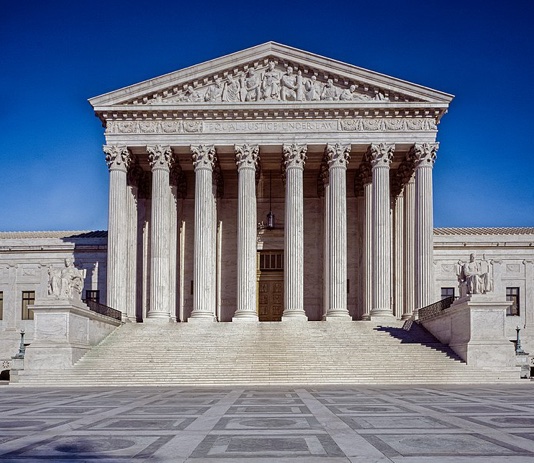by Giuseppe Gagliano –
SAN LUIS OBISPO (USA). “It’s not a normal court.” This was the characterization of President Joe Biden as he commented on the recent Supreme Court decision to eliminate Affirmative Action which gave a slight preference to minority groups in college admissions. Even Chuck Schumer, Democrat of New York and president of the Senate, expressed not sweet words, asserting that it is a Court dominated by “extreme right” excesses, typical of the MAGA movement, Donald Trump’s slogan of making the America.
Mitch McConnell, a Republican Senator from Kentucky and Senate Minority Leader, dissented while singing the praises of the Supreme Court in a recent article in the Washington Post. No problem according to McConnell. As we know, with the appointment of Amy Coney Barrett by Trump in 2020, the conservatives obtained a majority of 6 to 3 conservative-oriented judges with results very favorable to the right. McConnell is the architect of this overwhelming majority of conservative justices on the Supreme Court.
Three of the six conservative-leaning justices were nominated by Trump, a president elected by a minority of the popular vote, and even tainted by two impeachments. Two of Trump’s appointments came about in an anomalous and serendipitous way. One of these sandboxes is considered “stolen” by McConnell. When conservative Justice Antonin Scalia died unexpectedly in 2016 then-President Barack Obama appointed Merrick Garland to replace him. McConnell, then president of the Senate, did not submit the nomination for confirmation. With a very original and historically unprecedented gimmick, McConnell explained that in a presidential election year, judges of the Supreme Court could not be confirmed because the electors deserved to choose the new president first. Having frozen Garland’s nomination, fortune smiled on McConnell as Trump unexpectedly managed to defeat Hillary Clinton. As president, Trump withdrew Garland’s nomination and replaced her with Neil Gorsuch, a conservative-leaning judge.
A second nomination by Trump, Amy Coney Barrett, also happened by chance but also due to McConnell’s Machiavellianism and hypocrisy. When liberal Judge Ruth Baines Ginsburg died in 2020, Trump appointed Coney Barrett to replace her. The 2020 election was already underway through early voting, which is permitted in many states, but this time McConnell decided not to follow his rule as it applied in Garland’s case. Coney Barrett was confirmed very quickly. Trump’s other nomination was fairly traditional. Supreme Court Justice Anthony Kennedy retired in 2018 and Trump replaced him with Brett Kavanaugh. The confirmation was very contentious because during the hearings Kavanaugh was accused of rape when he was a student in high school. In the end, however, he prevailed and was confirmed.
The new majority of conservative judges has made itself heard. The most sensational case is obviously the revocation of the right to abortion. In the confirmations of all justices to the Supreme Court, Democratic senators repeatedly question them on the issue of abortion. All, including those appointed by Republican presidents, promise not to touch the law considering the right to abortion already established and consecrated by many precedents. The final outcome of the revocation was 5 to 4. The only one of the conservative leaning judges to side with the 3 liberal leanings was John Roberts.
In his article justifying the actions of the Supreme Court McConnell cites the number of cases in which judges do not always vote reflecting the ideology of the president who appointed them. He’s not entirely wrong but he has many. The swerve to the right by the Supreme Court in this session, which as in past years begins in October and ends in July, is clearly seen in the decisions which largely reflect conservative ideology. Two exceptions, however, would give McConnell a modicum of reason. The first would be to have maintained civil rights in a case brought by Alabama and another by South Carolina that would have given the state legislature exaggerated powers to determine and possibly overturn the outcome of the election.
However, the shift of the Supreme Court to the right remains decidedly as confirmed by the procedure of which cases to consider. Only 5 percent of Supreme Court appeals are accepted, and that leans to the right. It takes 4 Supreme Court justices willing to consider a case presented. Since there are only 3 liberal-minded judges, the vast majority of cases accepted for consideration and eventual decision come from conservative interests.
There is little doubt that the Supreme Court’s center of gravity has shifted to the right. This represents damage to the country currently but will continue for many years as judges are appointed for life. This forms a stark contrast to the House, Senate and presidency which change according to election results. Reforms are needed, but the Supreme Court is an “equal branch of government” according to Texas Republican Senator John Cornyn. Neither the executive nor the legislative branch can touch the Supreme Court. Cornyn is right but wrong at the same time. The legislature can modify the Supreme Court in terms of its number and could impose limits on the office of judges. However, political power is lacking since it requires executive and legislative power to be in the hands of a party and at the moment a super majority of 60 out of 100 votes is needed in the Senate. The only solution would be to create this kind of majority at the polls. Unlikely, but the Supreme Court’s swerve to the right, especially the repeal of abortion rights, could galvanize Democratic voters and continue to keep McConnell in the Senate minority. That’s exactly what McConnell fears. One reason for her attempt to defend the Supreme Court is to downplay the energy, especially that of women, of going to the polls. Ironically, McConnell-orchestrated Supreme Court successes could turn out to be pyrrhic victories in future elections.
* Domenico Maceri, PhD, is professor emeritus at Allan Hancock College, Santa Maria, California. Some of his articles have won awards from the National Association of Hispanic Publications.


